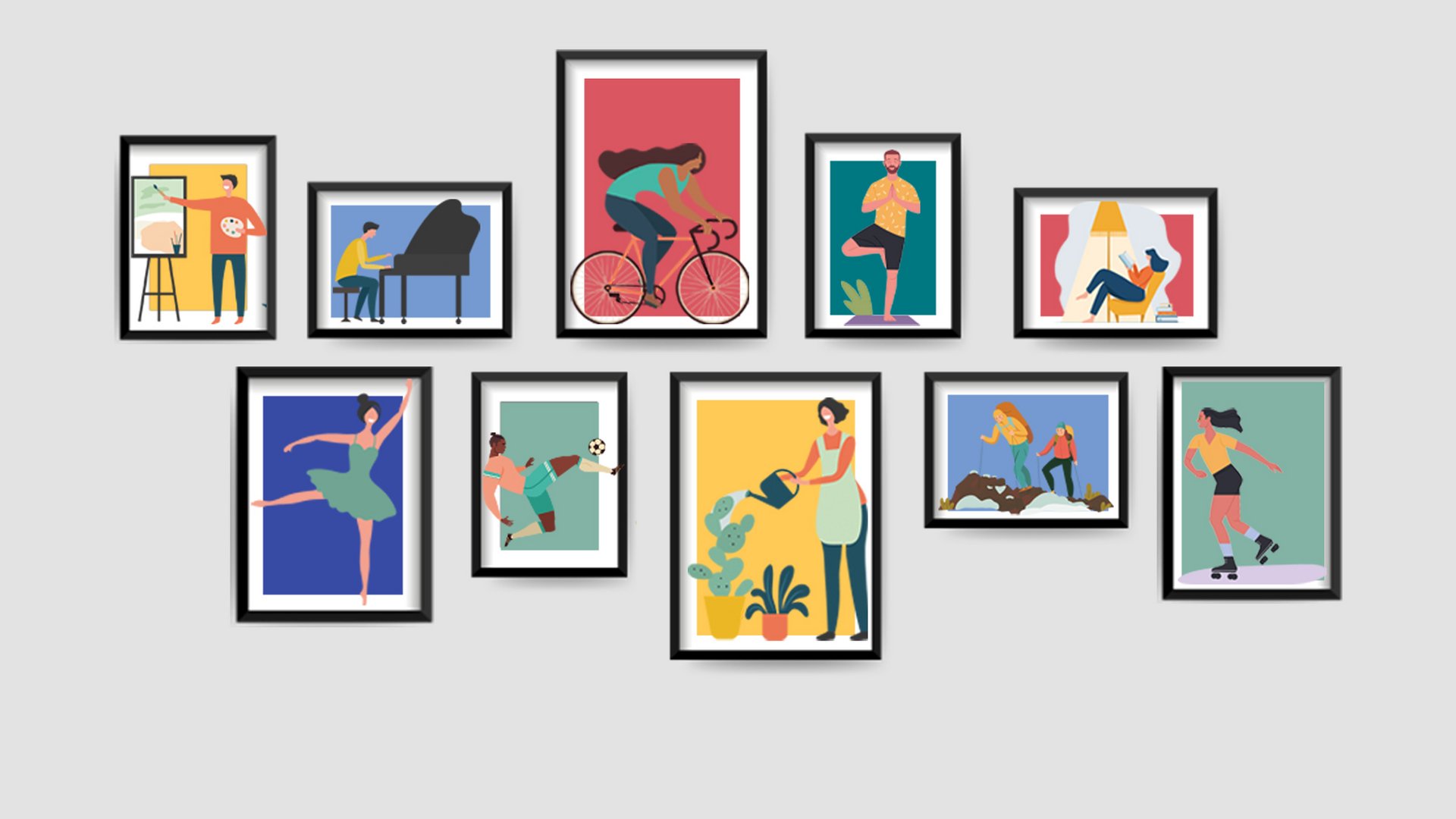
Prevention and health promotion
Resources to combat stress
Stress is one of the most common causes of accidents and illness. We all have resources that help us to cope with stressful situations. Our 2024 prevention campaign shows how we can discover, develop and use these resources for ourselves.
In addition to physical and social well-being, mental well-being is essential for health.

The WHO describes mental health as "a state of well-being in which the individual is able to fulfill his or her potential, cope with the normal stresses of life, work productively and fruitfully and contribute to his or her community" (WHO, 2001). Mental health is influenced by a variety of factors: personal experiences, genetic factors, social relationships and family environment as well as personal resources, employment and working conditions and housing conditions.
It is important to Implenia that our employees stay healthy and get through life accident-free. Stress, whether at work or at home, cannot always be avoided. Our 2024 prevention campaign, in collaboration with SUVA (Swiss National Accident Insurance Fund), shows how we can deal with stressful situations and stress more calmly.
Tips against stress
Tip 1: Integrate exercise into everyday life

Regular exercise is good for body and soul. It improves fitness, strengthens the heart and helps to maintain a healthy weight. In addition, exercise releases happiness hormones that reduce stress and increase well-being. This makes us feel more balanced and relaxed overall.
Getting going can be difficult: After a long day at work, tiredness sets in and the sofa beckons. Here's how you can motivate yourself:
- Find the type of exercise that suits you: Explore different activities such as walking, yoga or dancing to find out what you enjoy and what motivates you to keep moving regularly.
- Discover your own motivation type: Identify whether you are more motivated by social interaction, personal goals or rewards and adapt your exercise strategy accordingly.
- Formulate specific goals: Set measurable goals such as daily step counts or weekly exercise hours to better track your progress and stay motivated.
- Make a plan: Create a weekly schedule that includes set times for exercise sessions to ensure you get active regularly and minimize excuses.
- Establish habits: Incorporate exercise into your daily routine by developing routines, such as walking in the morning or cycling to work
- Use your time effectively: Look for ways to incorporate exercise into your daily activities, such as taking the stairs instead of the elevator or doing short stretches during work breaks.
- Get support: Look for training partners or join a sports group to get motivation and support and achieve goals together.
- Document your progress: Keep a written record of your successes and achievements, whether in a diary, app or calendar, to track your progress and motivate you to keep going when you have setbacks.
For complete couch potatoes, exercise for pleasure can be a great option. Try to find activities that you really enjoy. This could be a relaxing walk in nature, a dance class with friends or gardening, for example. Perhaps focusing on enjoyment will help you to develop a love of exercise and get active on a regular basis without feeling like you're forcing or straining yourself.
By the way: In November 2024, we will be offering one-hour workshops in Switzerland on the topic of "Stress and exercise" – more information to follow!
Tip 2: Take a deep breath

Stressed and somehow out of balance? Breathing exercises can help to relax the body and mind and can be easily integrated into everyday life. Take the test and feel how the tension is released after just a short time!
Five breathing exercises to combat stress
- Calm down with deep abdominal breathing: Abdominal breathing helps you to relax quickly and collect yourself. Lie on your back, place your hands on your stomach and breathe in and out evenly through your nose, raising your stomach as you inhale and lowering it as you exhale. This exercise increases your oxygen supply and promotes relaxation, even if you may feel slightly dizzy at first.
- Fully concentrated with alternate breathing: Alternate breathing relaxes, balances the brain hemispheres and promotes concentration. Close your left nostril with the index and middle fingers of your right hand and breathe in through the right one. Then close the right nostril with your thumb and breathe out through the left. Repeat this by inhaling through the left nostril and exhaling through the right.
- Relax again with progressive muscle relaxation: Progressive muscle relaxation also helps you to calm down. Breathe in slowly, tense as many muscles as possible, hold your breath briefly and relax your muscles again as you breathe out. Repeat this about five times and then sit or lie down briefly to consciously experience the relaxation. More about progressive muscle relaxation: Helsana blog
- Relieve anxiety with the right breathing technique: Anxiety triggers stress and shallow breathing. The right breathing technique can help to overcome anxiety. To do this, lie on the floor, place your feet flat on the floor and place your arms next to your body. Tilt your pelvis towards your navel, press your spine towards the floor and exhale completely. Hold your breath briefly, tilt your pelvis back and inhale, lifting the small of your back. Repeat this for a few minutes and then remain lying down for a moment to deepen the relaxation.
- Positive mood through conscious heart breathing: Fear, frustration, anger, annoyance or nervousness: consciously replace these negative feelings with more pleasant sensations. To do this, focus your attention on the center of your chest and imagine that you are breathing in and out slowly and deeply through your heart region. Consciously remind yourself of a positive feeling: something you love, something that brings you joy, someone you like. Practice several times a day for at least five minutes.
Tip 3: Cultivate relationships

In our hectic working world, we often overlook a powerful resource against stress: our interpersonal relationships. Whether it's support from family, encouragement from friends or collaboration with colleagues, strong and positive relationships help to reduce stress and promote our wellbeing. They offer emotional support, share burdens and find solutions together.
However, relationships can also be stressful, often because of our relationship patterns. How do we recognize negative patterns and replace them with positive and fulfilling ones? By reflecting on ourselves , honestly analyzing our behaviors and working on them in a targeted way, we can improve our relationships and make them less stressful.
As a starting point, it can help to ask yourself the following questions:
- What friendships do I currently have - personal or at work? Make a list of the most important people in your life to get a clear overview of your social network
- Which friendships should I consciously maintain and which should I consciously end? Decide which relationships are good for you in the long term. Focus on spending more time with the people who give you energy and set clear boundaries against energy guzzlers.
- What small things can I do to nurture the relationships I want to cultivate? Small gestures of appreciation, such as a thoughtful conversation or a spontaneous invitation, can make a big difference.
Watch out, energy guzzlers!
You probably know them – those guys who suck up more energy than a cranked-up vacuum cleaner. They hide in the darkest corners of your life and pop up when you least expect them. They are everywhere! From your colleague's constant nagging to your girlfriend's drama to your uncle's endless complaints about the weather. But don't worry, you're smart enough to see through them.
Sometimes it's hard to get rid of energy hogs completely, especially if they're your colleagues or family members. But don't worry, there is hope! Set clear boundaries and maintain a positive attitude. Don't let their negative energy drag you down. If you can't help it, think of them like an annoying wasp - stay away and ignore them as best you can. Keep an eye on your own energy and actively surround yourself with positive people who build you up rather than tear you down. Remember: You are the ruler of your energy castle, so defend it with all your might!
Tip 4: Bye-bye perfectionism!

We live in a world with practically omnipresent pressure to perform. Day after day, we are expected to meet a wide variety of demands both at work and at home. This sense of entitlement can be stressful and overwhelming. We should therefore not forget: We are all only human beings with limited resources, be it the time available, the available means and capacities, but also our actual abilities. We don't have to – indeed, we can't – be perfect and ideally meet all requirements. We have to do our best and face the world and its demands with composure.
Here are some helpful tips:
- Set realistic goals: Focus on achievable and concrete goals rather than perfection. Always have the next step in mind and try to complete it as well as you can. You don't always have to think in huge time and context horizons and worry about things that are so far away or so long ago. Work on what's right now!
- Set priorities: Determine the most important tasks and work on these first. Our everyday lives sometimes seem like sheer chaos and threaten to overwhelm us with their complexity. To keep ourselves on track, we need to distinguish between the important and the unimportant and tackle what is feasible and sensible. Once the important things are done, the unimportant things usually take care of themselves.
- Learning to delegate: Trust that colleagues can take on tasks. You are not alone here. Fortunately, how could you have done it all on your own? Trust your colleagues and sometimes hand over things that are too much for you. At times when it's easier for you, you'll be happy to take over for the others.
- Practice self-acceptance: Accept that mistakes are human and can serve as valuable learning opportunities. People make mistakes – that cannot be changed. The trick is to learn from them. If you make an effort and still make a few mistakes, it's not a bad thing, it's normal and nobody will be angry with you.
Joy despite a lack of perfection
Stopped painting because you weren't at the level of Picasso or van Gogh? Too bad about the joy! What have you always wanted to do but never did because it wasn't perfect enough? Seize the opportunity and open a new chapter for yourself. Whether you want to learn a new skill or revive an old hobby: plan your first step now and enjoy every step forward – often as a correction of a mistake.
Tip 5: Learning to let go

Who hasn't experienced it? A failed project, a conflict with a colleague or a wrong decision - negative experiences from the past can stay with us for a long time. But what happens if we don't let go of these stressful memories? Constantly carrying negative experiences around with you can have a significant impact on your well-being. You become emotionally exhausted, your stress levels rise and you are less able to concentrate on the present.
This constant strain not only affects your mental balance, but can also lead to serious health problems. Chronic stress can lead to sleep disorders, increased susceptibility to infections, cardiovascular diseases and even mental disorders such as anxiety and depression. It is therefore essential that you learn to let go of the old and focus on the here and now.
How to learn to let go
Letting go of negative experiences is not an easy task, but it is possible and, above all, worthwhile. Here are some practical tips on how you can do this in everyday life:
- Practice acceptance: Accept that negative experiences are part of life. Instead of constantly asking yourself why something has happened, try to accept what has happened and come to terms with it.
- Self-reflection and forgiveness: Take time regularly to reflect on your feelings and thoughts. Forgive yourself and others to find inner peace.
- Cultivate positive thoughts: Try to focus on positive aspects of your life. Keep a gratitude journal in which you write down daily what you are grateful for.
- Have conversations: Talk to friends, family or a therapist about your negative experiences. It often helps to broaden your own perspective by sharing with others and shed emotional baggage.
- Mindfulness and meditation: Practice mindfulness and meditation to be present in the moment and calm your mind. This helps to detach from stressful thoughts.
- Activities and hobbies: Find activities that bring you joy and distract you. A new hobby or sport can work wonders and help you clear your head.
By learning to let go of negative experiences, you create space for new, positive experiences and strengthen your mental and physical well-being. Try out these tips and find out which methods work best for you. Your future self will thank you for it.
Exercise: Saying goodbye to old burdens
This exercise helps you to let go of something from your past or to forgive someone. Here's how it works:
- Think about what burden from the past is still bothering you!
- Who triggered it?
- Write a letter to this person - but don't send it!
- Let go of the letter (and the feelings) - e.g. burn it on a campfire, scatter it to the winds on a ship, etc.
Important: Be honest and disclose all your feelings. Ask yourself what exactly hurt you and what you would like for the future. Ideally, you will turn the negative experience into an important insight that will improve your life in the long term.
Tip 6: Learn optimism

Optimists and pessimists see the world through different lenses. An optimist is someone who sees the positive in challenging situations. For example, when a project comes to a standstill, the optimist thinks: "This is an opportunity to learn something new and improve the result." Pessimists, on the other hand, tend to expect the worst in difficult situations. For the same project, a pessimist might say: "This will never work. We'll end up with double the work and nothing but trouble."
Optimism is not synonymous with naivety or a loss of reality. An optimist recognizes the challenges just like a pessimist, but consciously chooses to focus their energy on solutions rather than problems. Pessimists, on the other hand, often fixate on the difficulties, which can lead to them becoming discouraged more quickly and less actively seeking solutions.
Is optimism innate or can it be trained?
The question of whether optimism is innate or can be learned is one that concerns many people. Studies show that a certain degree of optimism can be genetically determined, but personal life experience also plays a major role. The good news is: optimism can be trained! Like a muscle, an optimistic mindset can be strengthened through regular exercise. It's about consciously choosing positive thought patterns and anchoring them in everyday life.
Five tips for more optimism in life
- Have positive self-talk: Pay attention to how you talk to yourself. Replace negative thoughts such as "I can never do this" with constructive sentences such as "I can master this if I keep at it."
- Practice gratitude: Every day, write down three things you are grateful for. This simple trick helps you to focus on the good things in life and push negative thoughts into the background.
- Solution-oriented thinking: When faced with problems, concentrate on possible solutions instead of the difficulties. Ask yourself: "What can I do to improve the situation?"
- Create a positive environment: Surround yourself with people who have a positive attitude. Optimism is contagious and can help you become more optimistic yourself.
- Use humor: Laugh at yourself and difficult situations. Humor can help reduce stress and promote an optimistic attitude.
By integrating these strategies into your everyday life, you can continuously develop your ability to think optimistically and thus deal better with stressful situations.
Tip 7: The path to greater inner contentment

Contentment is a powerful key to our well-being. It gives us a feeling of inner peace, balance and fulfillment. Those who are content radiate this positive energy, face the challenges of everyday life with more composure and feel happier overall.
Contentment is not only a pleasant feeling, but also contributes to our mental and physical health. It helps us to enjoy life in all its facets and to go through life with a positive attitude.
How can you increase personal happiness?
Satisfaction is not exclusively dependent on external circumstances, but above all on our inner attitude. You can also improve your own satisfaction within an existing life situation. Personal attitude plays a decisive role here: acceptance, realistic expectations and the ability to recognize the good in every situation are key to well-being.
The topic of gratitude is particularly important here. Those who regularly practise gratitude focus their attention on the positive aspects of life and thus increase their satisfaction. The result is fewer negative feelings, less anxiety, fewer physical symptoms of illness and less stress and depression.
Five tips for more satisfaction in life:
- Set realistic goals: Set achievable goals and celebrate even small successes. The feeling of having achieved something increases satisfaction enormously.
- Practice gratitude: Take time every day to think about the things you are grateful for. This sharpens your focus on the positive things in life and makes you happy.
- Promote self-acceptance: Learn to accept yourself as you are. Perfectionism can lead to dissatisfaction, while self-acceptance is a source of inner peace.
- Cultivate social relationships: Invest time in relationships that are good for you. People who feel connected to others often experience more satisfaction.
- Live in the here and now: Make sure to live in the moment instead of fretting about the past or worrying about the future. Being present in the now creates contentment.
Try out what specifically helps you to remain calm and balanced even in challenging situations. Contentment is not a goal, but a path - and every step on this path brings you closer to a more fulfilling life.
Tip 8: Get help

There are many ways in which we can help ourselves to deal with stress, challenges and difficult situations. But sometimes we get to the point where we can't get any further on our own. In these moments, it is important not to hesitate to seek outside support. This is not a sign of weakness, but a powerful step towards seeing things more clearly and taking the pressure off yourself.
Which challenges are worth seeking help with?
If you notice that you are emotionally or mentally stuck, that tasks are getting on top of you or that you feel permanently stressed, exhausted or even desperate, it is time to seek support. It is also a good time to seek help if you notice that your thoughts are often going round in circles or you are having difficulty making decisions.
Who around you can help?
There are many possible places to turn to: friends, colleagues, superiors or family members - often people who know you well and can offer you a new perspective. Professional support, such as psychological counseling or a coach, can also help you to sort out stressful issues and develop solutions.
How do I get help if I find it difficult to take the first step?
Sometimes it's not easy to start the conversation - perhaps because you're afraid of showing weakness or because you don't want to burden anyone. An easy way to start is to say: "I'm not feeling so well at the moment and I don't know exactly how to go on." Or: "I have the feeling that everything is getting too much for me and I could do with an outside perspective." In most cases, the other person will be grateful that you speak openly and will be happy to support you.
Professional help from Lyra, anonymous, free and available around the clock
The Lyra Wellbeing (formerly ICAS) external advice center is available day and night free of charge to all Implenia employees and people in the same household and offers support for emotional stress, grief, anxiety, divorce, conflicts, etc. The center can also provide personal advice if required. If required, personal counseling can also be arranged near your place of work. It does not matter whether your concerns are of a private or work-related nature. Further information is available on the Implenia intranet or on our onsite.
5 tips for getting help in difficult situations:
- Recognize your need: pay attention to your own signals and admit to yourself when you need support - that's the first step.
- Be clear about what you need: Think about what could help you in advance. Do you just want to get everything off your chest or are you looking for specific advice?
- Talk about it: A direct conversation with colleagues, friends or your manager can already provide a great deal of relief.
- Choose the right moment: Find a calm, relaxed moment for the conversation - this will make it easier for you and the other person.
- Use professional services: If you realize that personal conversations are not enough for you, don't hesitate to turn to professional services.
Resources to combat stress
The Implenia Prevention Campaign 2024 aims to remind us how important the balance between stressors and resources is for our health.
The topic is more important than ever: According to the Job Stress Index 2022, almost 30% of employees in Switzerland are exhausted. Only 26% feel really well.
The perception of stress is very individual and varies greatly from person to person. So I can't just assume that my own perception of stress also applies to the people around me.
Stress is caused by strain. But not every strain leads to stress. The stress reaction always depends on how those affected assess the stress and what resources they can use to counteract it.
Everyone is responsible for thinking about the stress factors, recognizing them or reducing them. This includes knowing which resources help us to reduce stress and how we can consciously integrate them into our lives.
The Swiss Accident Insurance Fund (Suva) distinguishes between four different levels of resources.
Over the course of the year, we would like to introduce you to some resources from the Suva "resource box".
Picture tips: © istock.com / Implenia
Slides: © SUVA
Interested?
You can find more information on this topic under the following links
- Stress in the workplace, SUVA
Stress at work - what to do? | Suva - Film "Let go of stress",SUVA
https://www.suva.ch/de-ch/download/videos/napo--stress-lass-nach---ein-film-zur-sensibilisierung/standard-variante - Dealing with stress
https://stressnostress.ch/ich-und-stress/meine-stressursachen/ - ABC of emotions
https://www.wie-gehts-dir.ch/emotionen-abc - Recognizing the causes of stress
https://stressnostress.ch/ich-und-stress/meine-stressursachen/




